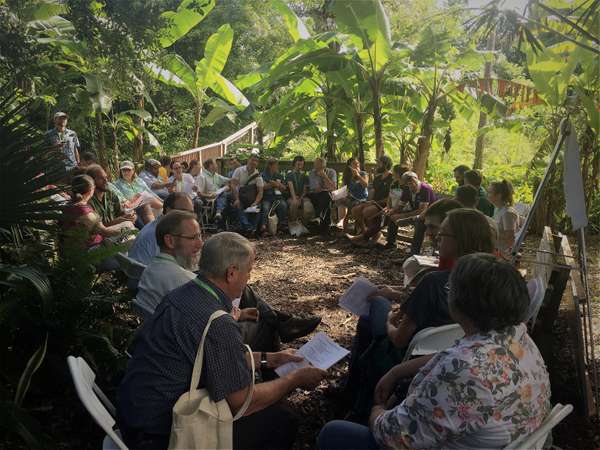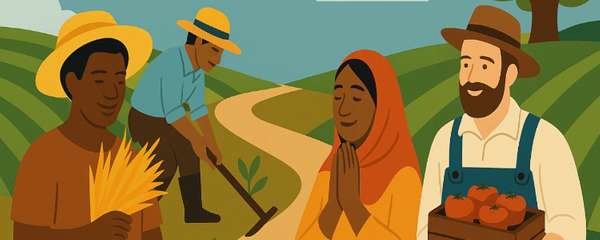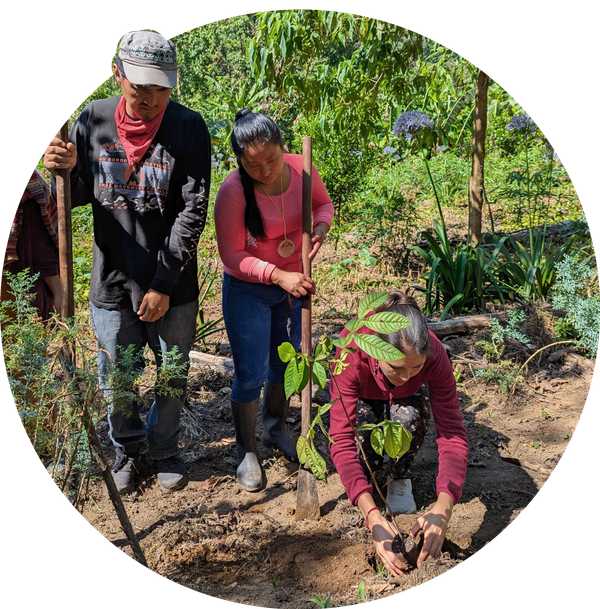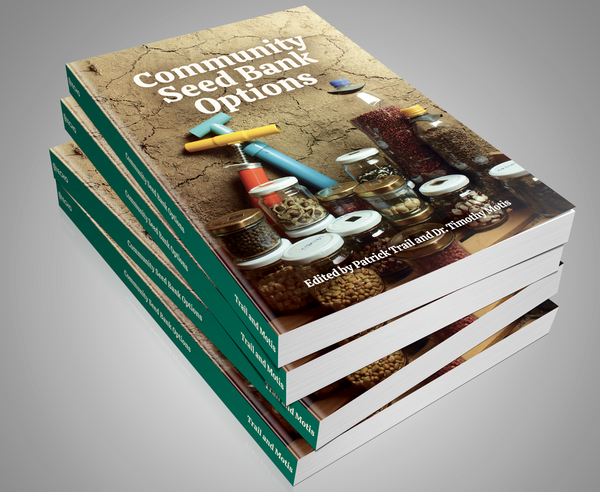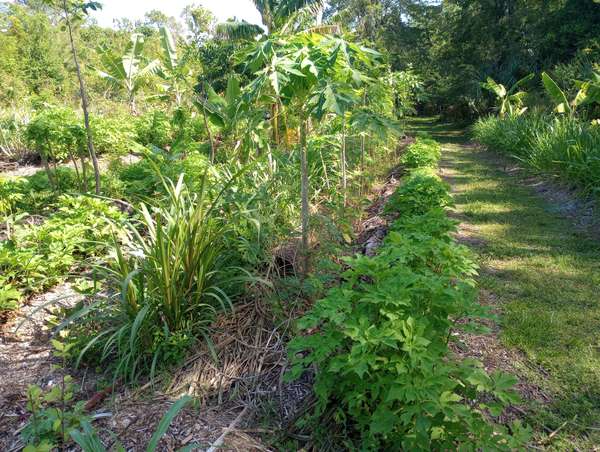Mises à jour de ECHOcommunity
EIAC 2025 Speaker Highlight: Roy Danforth and Paul Noren 2025-07-01
Roy and Paul met working on the same project in Congo in 1980 and became a team for 40+ years. Together, they have written 3 books on Agroforestry in the hot, humid tropics. Their years of working together have generated many stories to tell and practical suggestions to pass on to the younger generations during this year's conference!
Roy was born in Southern California and grew up camping and loving the outdoors, especially in rustic areas, which led to his interest in college in Biology. He and his wife got married after a year of college and were called to the mission field a few months later. They both joined the Evangelical Covenant Church and served 20 years in the DRC and 20 years in the Central African Republic/Cameroon, where they worked alongside farmers helping them with new species of beans, veggies, and fruits, along with improved farming methods. Roy is retired now, but continues to advise several other ag projects, mostly in Africa.
Paul Noren was born and raised in the Ubangi region of the DRC to missionary parents. His dad was from a farming background in Kansas and was also an outdoors sportsman, so Paul was introduced to planting things and spending time in the wild from his childhood on. Paul and his wife Sheryl went out as missionaries to the area where he grew up in 1979. Paul has worked in three countries over the past 45 years: DRC, Central African Republic, and Cameroon.
Register to hear these remarkable speakers!
ISHS Symposium on Underutilized Plant Species: Speaker Highlight 2025-06-24
Dr. Festo Massawe Ph.D.
Potential for underutilized crops to improve nutrition security and socio-economic equity in a changing world
Professor Festo Massawe is a crop scientist with expertise in crop diversity, sustainable and resilient food systems. He is a former Head of School of Biosciences at the University of Nottingham Malaysia and currently leads Food Systems Diversification Research team. He has extensive experience in developing and leading research, training and knowledge exchange activities focused on underutilized crops (and has worked) with partners in Asia, Africa and Europe. His research is focused on promoting food systems diversification through wider use of underutilized plant species, believing that these efforts will lead to a healthy, sustainable and resilient future.
Speaker Highlight: IV International Symposium on Underutilized Plant Species 2025-06-17
October 20-24 | Fort Myers, FL
See the speaker lineup and their plenary topics for the October 2025 ISHS Symposium on underutilized plant species! Join us to engage in a variety of ideas and topics, including the impacts that underutilized plants can have on nutrition, food security, socio-economic equity, marginal ecosystems, and more.
ECHO Innovation Exchange Conference this July in Tanzania 2025-06-17
July 16-18 | Moshi, Tanzania
We are delighted to ask you to participate and present at our upcoming Innovation Exchange Conference organised by ECHO East Africa in collaboration with the Watersheds Foundation. The conference will focus on Water, sanitation, and hygiene (WASH), Sustainable Agriculture and Appropriate Technologies. Innovative ideas by groups funded by the Watersheds Foundation and previously by Waterlines will be shared. Practices, experiences, and technology by ECHO and regional partners will be showcased across topics in food security, sustainable livelihoods, water, sanitation, and hygiene (WASH).
Conference Presentations Now Available! 2025-06-03
ECHO International Agriculture Conference 2024 was a rich time of learning and discussion about important topics that affect small-scale farmers around the world! We are excited to share that the presentations are now available for you to view and share. Some presentations you may enjoy include:
- Smallholder management of fall armyworm
- Best practices in promoting livestock among the poor
- Can innovation end poverty?
2025 ECHO International Agriculture Conference Registration is Now Open! 2025-05-27
Registration is now open for the 2025 ECHO International Agriculture Conference!
Fort Myers, FL | November 11-13, 2025
National Gatherings in Central America 2025-05-16
We are very happy to announce that within the current implementation process of our Regional Impact Center of ECHO in Central America and the Caribbean, we have scheduled national gatherings in Honduras, Guatemala, and Nicaragua, with the aim of exchanging information and establishing a dialogue with you, in order to build a participatory working and training agenda. The gatherings are scheduled for the following dates:
- Honduras - May 27 in Tegucigalpa, at the offices of ANAFAE (Colonia Miraflores)
- Guatemala - June 4 in Cobán at Centro de Formación y Capacitación Noj and June 10 in Guatemala City at the headquarters of Casa del Alfarero.
- Nicaragua - June 17 and 18 in Matagalpa, at Rayo de Sol.
New ECHO Book Release: Community Seed Bank Options 2025-05-06
Community Seed Bank Options
edited by Patrick Trail and Timothy Motis
Buy now as an eBook or paperback
"Community Seed Bank Options is a practical, comprehensive guide to the hands-on management of community seed banks. It features illustrative examples and proven methods to walk readers through each step while clearly explaining the science and biology behind seed saving. This book is an essential resource for anyone immersed in food sovereignty, seed stewardship or community-led development. Congratulations to the ECHO team for delivering such a valuable and accessible toolkit."
Ellie Lovett, Director of Project Morro
Community Seed Bank Options is the compilation of many individual research experiments, papers, ideas, technologies, and experiences offered over several years by individuals working to further best practices in community seed banking, seed saving, and genetic preservation.
While ECHO has collected and validated these best practices over many years, ECHO does not take credit for each individual innovation, as many come from network members (maybe even you!). The book features images and graphics that explain, illustrate, and simplify much of the information.
Upcoming July TAD Trainings - Bundle & Save! Early Bird Ends Soon! 2025-04-29
We have two Tropical Agriculture Development trainings coming up in July at ECHO North America!
July 7-11 : Introduction to Tropical Agriculture Development
This is a 5-day course with a variety of topics that focus on improved food security and agricultural livelihoods for small-scale farmers. For more information and to register click the link below:
July 15-18: TAD II - Syntropic Agroforestry
This is an interactive 4-day agroforestry training session. Learn how to cultivate abundant food and timber in a system that mimics a natural forest. This course will cover the principles and practices needed for a beginner to plant his/her own agroforest. For more information and to register for this course click the link below:
Bundle & Save!!
You can register for both trainings and stay at ECHO for two weeks at a discounted rate! Use the link below to register for both traings. If you register before May 7th you will get an additional discount with our Early Bird price!


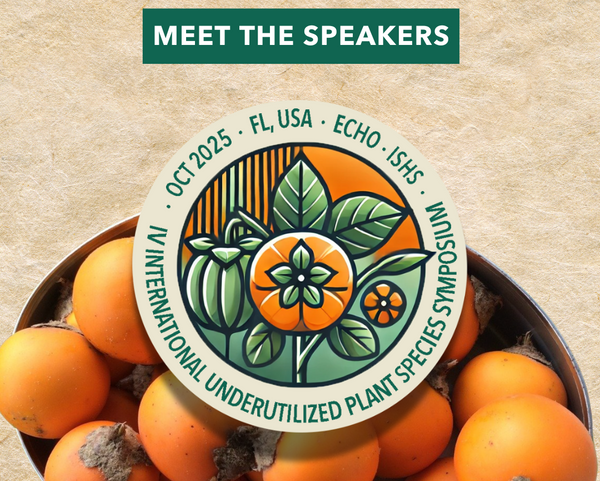

.png?w=1200)
